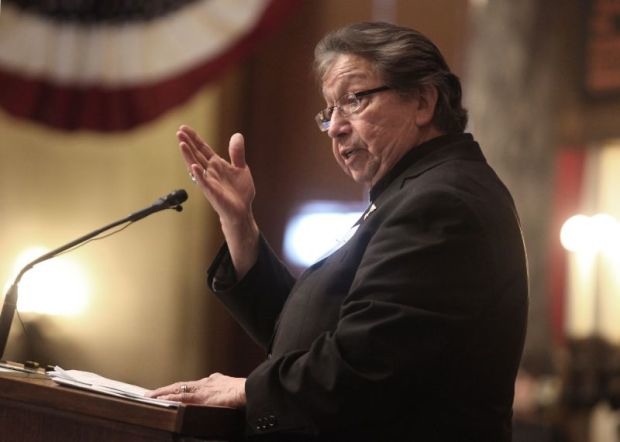Read this article on line Back
 A
A
State Journal reporters Dee Hall and Mary Spicuzza bring you their takes on state and Madison-area politics.
A Chippewa leader accused state officials of spreading inflammatory "political propaganda" about spear fishing and called on lawmakers not to "cash in our natural resources for corporate profit" with plans for a huge iron mine in a pointed speech Tuesday.
This year's State of the Tribes address, delivered by Gordon Thayer, chairman of the Lac Courte Oreilles (LA'-coot -oh-ray) Band of Lake Superior Chippewa Indians of Wisconsin, so offended one Republican leader that he walked out of the speech.
"We're not your adversaries," Thayer told the full session of the Legislature gathered in the Assembly chamber for the annual event.
But during the nearly hourlong address, Thayer railed against the state Department of Natural Resources over its news releases and public comments about tribal spearfishing declarations for walleye in Northern Wisconsin, saying the agency was engaging in a misinformation campaign that could inflame "racial tensions." He assured lawmakers that "the eleven tribes of Wisconsin oppose the proposed mine and its permitting process," and stand unified with the Bad River Band of the Lake Superior Tribe of Chippewa Indians against the new law to ease environmental regulations that will make it easier to build an iron ore mine in northern Wisconsin. And he criticized Gov. Scott Walker for not mentioning the tribes during his annual State of the State address in January.
"We can't be dismissed as a subgroup of people in Wisconsin," he said.
Assembly Speaker Pro Tem Bill Kramer, R-Waukesha, walked out, later saying that Thayer was talking out of both sides of his mouth. He said Republicans approached the Bad River about the law but the tribe refused to confer, saying only they opposed the mine.
After the speech, Assembly Speaker Robin Vos, R-Rochester, thanked Thayer and stressed the importance of communication.
"It's essential that we maintain good government-to-government communications and find the areas of shared interests," Vos said in a statement. "While we may not agree on every issue, we can agree to listen to each other's concerns and work together on the problems facing our state."
And Walker defended his communication with the tribes, saying he has met more than 1,000 times with Wisconsin's 11 tribes.
"While we may not always agree on certain topics, there is an understanding and respect for the open lines of communication between me personally, top officials in my administration, and leaders of Wisconsin's tribes," Walker said in a statement.
DNR Secretary Cathy Stepp later said the Chippewa tribes are acting lawfully within their treaty rights, but she added that she wants to negotiate with them due to her concerns about how tribal spearfishing will affect other fisherman.
"We have reached out to the tribes asking to meet with them to discuss the walleye spearing declarations," Stepp said in a statement.
Bill Cosh, spokesman for the DNR, said those requests "have been met with mixed reply.
